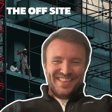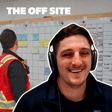Become a Creator today!Start creating today - Share your story with the world!
Start for free
00:00:00
00:00:01

E 16: Advice for Engineers from a CPB Construction Manager
In this episode, Jason & Carlos are joined by Andrew Wiadrowski, Construction Manager for CPB working on the Warringah Freeway Upgrade Project in Australia.
Drawing from his experience progressing from site engineer to construction manager on infrastructure projects, Andrew discusses how the role of engineers have changed, and where he recommends budding engineers to start their careers today.
Transcript
Introduction of Hosts and Guest
00:00:00
Speaker
Hello, and welcome to episode 16 of the Offsite podcast where we chat all things construction and technology. My name's Carlos Cabalu. And I'm Jason Lanzini. Hello, Carlos. How are you doing? Pretty good. Thanks. How are you? I am good. I was just, as we were just saying before we started recording, I'm, I'm home alone sitting in a dungeon or like my basement, uh, recording a podcast. So would that, would you call that living the dream? I'd say so.
00:00:28
Speaker
Um, funny enough, I, uh, had a conversation with someone the other day and, um, I was about to say he's a fan of the show. Fan just completely crinched me up. He's someone who listens to the show. Um, and he was like, Oh, Jason Stoppelganger and sent me a picture. And, um, I'm still sharing now. This is such a set up. I actually think it's pretty good. That was not even a segue from what I just said. You just horseshoot that in there. Totally.
00:00:59
Speaker
Prime Minister of Canada. Okay, I'll take that. It's dark. I'm not snacking you off. Can you send me his number?
00:01:07
Speaker
I think it's a pretty reasonable one, but yeah, I think that's pretty, pretty strong. Yeah. Absolutely not. Right. Um, so today we have a guest on the show. Um, but as, as he's based over in Australia, Jason, I'll let you do the introduction. So over to you.
00:01:30
Speaker
Cool, yeah, today I'm really excited to be joined by Andrew Rudrowski, who's a structures manager for CPB currently working on the Waringa Freeway upgrade project. I guess it's a really tight and challenging project. I've had it described to me by folks on the project as like a billion plus dollar enabling project for the Western Harbor Tunnel that Carlos has always spoken about for that goes sort of under Sydney Harbor.
00:01:59
Speaker
Uh, the B1M did that whole video, uh, walkthrough analysis of the, uh, of the project. And I guess, um, most importantly is, uh, Andrew and I are the same age, um, regardless of, uh, how much younger he looks in his LinkedIn profile. So Andrew, mate, thank you very much for staying up late and joining us. Really appreciate it. Uh, not a problem. Pleasure to be here. I've, um, I've listened to the first, uh, to your podcast and I really enjoyed it. So, um, very pleased to be a guest.
00:02:28
Speaker
Cool. Thank you. Thanks. So I've got like, uh, I've got like a ton of questions. And, um, obviously we, um, we went to, we were at dinner a few weeks ago and, uh, and we, we started going back and forth. And so I guess for those listening, you've your background, you've worked like on a lot of large infrastructure projects.
00:02:48
Speaker
And you've, I guess, walked the progression from site engineer to your current role.
Andrew's Career Journey
00:02:55
Speaker
And I guess this question is a little bit out of the blue, but sometimes I reflect on it. Is it, do you have a part of that journey that was like your favorite, like a role that was your favorite, you know, from site engineer all the way up?
00:03:09
Speaker
A tough question, and I think everyone would be different. But for me, I love construction. I love the site side of the role. So for me, back when I was a site engineer or a grad engineer, I was spending 60, 70% of my time on site around construction activities, watching things happen, watching cranes work, watching concrete pours.
00:03:39
Speaker
That's probably the time I enjoyed it the most, probably slightly now been over 10 years in the industry and the industry's probably changed a bit as well. And it was probably a little bit more pure engineering construction back at that point in my career, whereas.
00:03:58
Speaker
you can see the industry and the role of the engineer within the industry has changed significantly over just the last 10 years. I thought it would have been very fascinating to go work 20, 30 years ago, see how much more even pure again it would have been. But the engineer is becoming much more a jack of all trades and a project manager rather than an engine infraction engineer. So probably that time in my career was probably the one I've enjoyed the most.
00:04:29
Speaker
Yeah, I sometimes think about it when I get, I don't know if you have that thing where you get like your phone sending you like memories of old photos and stuff from the past. And occasionally I get photos from projects from like, you know, 2011, 2012. And yeah, it does feel like as a site engineer, you have this like connection with that group of people that you're trying to build something with.
00:04:53
Speaker
Uh, and you're working as a team, it's got like that, like football, like rugby team vibe. You're trying to make stuff happen and get stuff done on site every day. And then as you go up through different roles, uh, you kind of, I guess there's an excitement when you hit like, maybe like a project engineer and you're doing that forecasting thing. Cause you feel like you're running a business and there's like the money aspect to it, uh, comes into it. Um, but then I feel like beyond that, you kind of start to lose the connection with the site a little bit and it.
The Evolving Role of Engineers
00:05:21
Speaker
It becomes less about construction, I guess, like what you were saying, right? It's like less about the actual building or something and, and more about like the business of it.
00:05:31
Speaker
Yeah, you're completely right. And it's interesting, I think, as you see people in those more advanced roles, the SPE and the project manager roles, there's a real variety of people and their interests, and that's reflected on their take on how they perform that role.
00:05:51
Speaker
So you see some SPs of a more mature vintage who just froth on the construction and the site side of things and rather than progressing past an SP, they're happy to sit in that SP role because it's a nice spot for them where they can still stay connected to the site and don't have to deal with some of the politics and that's the management side of things that take away from the time you can spend on construction activities.
00:06:18
Speaker
Whereas other people are probably more business orientated and prefer the forecasting, the month end, all those sort of office based activities that are still important and play a role in the overall picture. But it's real interesting to see that dichotomy between different people within the role and different takes on it.
00:06:39
Speaker
Yeah, and then like I was talking to someone else, someone I used to work with when I was like a site engineer and today, and because I shared a post recently of like, of talking about logistics and it was an image of a project we'd worked on back in like 2012 or 2013.
00:07:01
Speaker
and we were pouring concrete from a barge into a pile and at the same time we had like a piling rig that we'd like craned in and sat on top of the same structure and he was talking about like all the change and all the paperwork and stuff he had to do because it was like a change to our construction sequence.
00:07:22
Speaker
And I guess it got me thinking about like how much paperwork and stuff like you, like you were saying before, the role of like that, the site engineer has changed like significantly over time and in the direction of like, would you say more paperwork?
00:07:37
Speaker
Oh, a hundred percent. You look at the role of an engineer and the function it serves now. Really the role should not have engineer in the title because at no point do you get a calculator out and do any statics calculations or calculate the pressure on formwork or anything like that. The reason you use your calculator is to do your cost analysis for your forecasting.
00:08:04
Speaker
Um, so that's a complete change. And so for me, like, I really enjoyed the pure construction side of things that I generally froth and get excited on. Um, I've used froth too many times in this podcast already. Yeah, that's going to make the search. We'll have to do some translations. Uh, we'll put it through like chat GPT or something to do some translations, but for UK audience, uh,
00:08:29
Speaker
Oh, there'll be little disclaimers in the, in the thing, but yeah, you're coming. What do you think slower as well? Um, no, but I generally get excited by constructions, big cranes, um, big lifts, big false work decks, all that sort of stuff. That is generally my passion.
Passion for Construction Challenges
00:08:48
Speaker
And probably the thing that has brought me the most fulfillment in my career is being able to drive past a project I've been on and literally look at the foundations of the bridge above me.
00:08:59
Speaker
I remember that night when we had a problem with the pile concrete. We had to stay back till like literally eight o'clock because the pile kept dropping. We didn't know where the concrete was going. We had to keep the back span open. We were all there until 10 p.m. like pull daymakers out of nowhere. And it's those sort of stories. And you go, well, we dealt with that. That's a little story. No one else really knows about, like you said, about the team that was there doing it. And that's the thing that really gives me the sense of pride and why I'm so passionate about it.
00:09:29
Speaker
Do you, do you find people like, as they go through, as you were saying before, some people like have different things that they, they take out of it when they get up in those more senior roles. But this is kind of also reflecting on the conversation I had today. Do you find people like lose the love for it and then drop out of construction and go into, to other things as they sort of, it becomes less about the construction and more about like the, the business.
00:09:54
Speaker
Interesting question. I would actually say the answer to your question is yes, but not for the reason you gave. I think people are passionate about construction. They stay in it even with the paperwork side of things because they still get to be involved in the construction. They may just choose a slightly different path.
00:10:14
Speaker
So they can be involved in the construction side of things more and less on the paperwork. So whether that means they get to a position and don't want to progress further than that. Or maybe I've heard of some engineers and one of the best site manager I've ever worked with. He started as an engineer in South Africa and in the UK.
00:10:32
Speaker
And I know in the UK, engineers are much more hands-on, do their own set out. All that sort of stuff came to Australia, was horrified that an engineer spent most of his time in the office and switched to become a supervisor. But then because he had an engineering background, he was fantastic as an engineer, as your site manager or supervisor, because he understood what you're expected to do and produce, and he would actually support you rather than just yelling and abusing you to not have what he wanted.
00:10:59
Speaker
But then I would say a lot of people drop out early on in that site engineer PE space because they weren't expecting the hours, the pressure and all that sort of thing. And they just get over that and they either move. It's interesting. A lot of people have moved in probably that I've had interactions with in the last five years, either into the consultancy space or into the client space because it's still in the same industry.
00:11:25
Speaker
you know, a tool, five sort of business hours, all of that sort of perks, um, without some of the drawbacks of the construction slide. Yeah, that's interesting. I wasn't going to go down that angle, but like, if you, if you think about, if you, let's say you were talking to a younger version of yourself or you were talking to a young site engineer, that's starting out. What do you think about the idea of going, whether it be consultancy or clients side in terms of people's like, what is it something that people.
00:11:54
Speaker
should feel comfortable to do to get the, I guess, the, the less slightly less pressure and maybe less hours or, or does it, I guess, stunt their progression and development.
00:12:09
Speaker
That's a hard question to answer because it's all going to be in terms of what the individual, what aspirations and what dream role or position they have. So if, if you want to, and this is purely my opinion, so not saying it's the right one, but. We're all about opinions, mate. Nothing on here we've ever spoken about is fact. It's strictly opinions. We should change, we should change the name of the podcast to strictly opinions.
00:12:42
Speaker
So for me, to go into the client side role, or go into the consultancy role, having the contractor's background knowledge experience is crucial to being able to add value either in the consultancy role or the client role.
00:12:59
Speaker
Unfortunately, more on the client side space, it's very evident which client people you interface with who have had constructors backgrounds and who haven't. And not saying that people haven't don't provide value, but just a completely different type of value.
00:13:15
Speaker
So for me, so it all depends. I've always wanted to stay on the construction side. I think I would be bought on the consultancy side. I think the consultancy side is all the office work an engineer does. It's forecasting, planning, programming without the payoff of actually going and doing the work. Some people I know love that side of things and hate the pressure, the stress.
00:13:38
Speaker
The phone calls every 10 minutes from a form and going, where's my concrete? Um, why am I missing pipes? Um, you've, you've, you've walked the line very, very eloquently, but like, let's say you get a phone call from, from, uh,
00:13:54
Speaker
a young person, they're leaving you there, they got a couple of different offers, one from a client, one from a consultancy, one from CPV, and says, Andrew, what should I take? I want to be able to eventually be, I want to leave my options open, I want to have the option in the future to go senior in either of those three streams.
Benefits of Contractor Experience
00:14:21
Speaker
Where should I start?
00:14:23
Speaker
You made the question easier and I don't have to hotpack it as much as I was going to without that last little disclaimer from you. So if you want to leave your options open, you should be going contractors side to get as high as possible because that keeps all three options open because you've got the knowledge and the experience of how to actually build something.
00:14:44
Speaker
If you go to client side too early, you don't have the knowledge of how to actually construct, how things actually get constructed. Yes, you get to watch it, but because you're not involved in the nitty gritty, you just lose and you don't, in my opinion, get the full understanding of how things work, how construction works.
00:15:03
Speaker
Like it's as simple as like, how does form work get erected? How much crane time do you need per, you know, 10 square meters of form work? How long does it take to pump 10 tubes of concrete? How, how much room do you need? Like they're the fundamentals that you learn on the contractor's background. They're all things that build up a program, a forecast. Likewise with consultancy. If you go to consultants, you're meant to be forecast. How can you forecast something you've never done?
00:15:27
Speaker
How can you plan something you've never done? Um, and it's something it's the difference between, sorry, sorry. It's just saying it's like the difference between doing something and watching someone do it, you know?
00:15:38
Speaker
Correct. So it's one thing and I've luckily been able to do it to an extent. I wish I could have done it more with my teams on this particular project. I need to try and do it more and give my engineers more of an opportunity in the space. But I'm a big fan. This is what I got to do as a sign engineer is my form and put me on tools.
00:15:58
Speaker
I greeted concrete. I was on a needle. I had to help blow out a block line on a static line pump. I got the driver dumpy. I got to literally do the tuck. And when you're actually looking at standing there, you're like, how hard is it to pull the screen through some cold prep?
00:16:18
Speaker
Yeah, I challenge anyone to go do it has anything steady because it is impossibly difficult. Definitely for a short little bloke like me I'm needy in concrete kind of pull this grade. Everyone's laughing at me for me that starts for Yeah, yeah, the back starts falling apart. It's it's
00:16:36
Speaker
It's hard work. Well, if you hold a needle, like I remember I was holding a needle for maybe an hour at best, three hours later, my hands and my shoulders were still vibrating with the needle. Um, and then you, you know, you expect people to go do a four over 10 hours and you get shield. You want, why do you have three bikes standing around? Why need to circulate them through the needle and the shovels until you actually go do it. You go, I'm just wasting money there. Yeah. Yeah. Again, translation for those in the UK and needles, a concrete vibrator. Um, sorry.
00:17:08
Speaker
That's good. Carlos, do you have any questions, man? Yeah. As you're just touching on what you just said about the experience side and consultancy, I think the same as with planners. The best plans always work with my ex-engineers, whereas some planners are going straight to planning. And I don't really get how you could do that because you're just going to play post box to an extent because you don't have the experience to sort of properly. I probably offended a whole bunch of planners there, but that was what I've experienced. But tying back to
00:17:38
Speaker
You say you've loved obviously working on site and being close to site, being in the thinking construction. You should definitely move to England, by the way, because all the QS's do all the heavy lifting engineers just stay on site, which you'd probably enjoy a bit more. But how does it affect, because you manage things like commercial and you're overseeing a lot more in Australia compared to what I experience over here?
00:18:01
Speaker
How does that actually affect your relationship with say the client? Because here the engineers could sort of focus on delivering the job and the commercial team are sort of to an extent dealing with like forecasting change and the politics side of things to an extent. Does that make it more stressful over there because everything is all within the same team. So you could potentially have disputes, which is distracting you from just trying to deliver what you want to deliver.
00:18:28
Speaker
Definitely. It's interesting you came from the client side. I would say it creates more issues within the subcontractor main contractor space. And again, this is one of the journeys I went on as a young engineer. I remember as a young engineer, it was like,
00:18:45
Speaker
screw the subby it's always their fault do all that um and i'd like to reflect now on some of the emails and some of the correspondences um i sent over my time i look back and cringe at horror in terms of how young and naive i was and what i said and how i said it
00:19:01
Speaker
But that's definitely a thing because I'm managing the cost. So if there's day works or there's a delay and I've got to explain it up strength to my management, so then I'm going to try and manage the subby as politely as possible to minimize those interactions. I've got to have upstream. So it definitely creates space. I think there is definitely within the industry, there's.
00:19:21
Speaker
like pressured to put pressure down on the subby and whereas as I've moved on I've like definitely realized it's a relationships business at its core so you need to develop those relationships they need to be mutually beneficial like we if we make money in a subby doesn't that's not actually a good outcome because
00:19:43
Speaker
you're not building trust, then use that subby again or anything like that. The best outcome is we make money and the subby makes money. And that comes through trustful relationships, relationships that work two ways. So we take on feedback, we improve how we interact or how we provide access or the conditions we let them work in and vice versa.
00:20:04
Speaker
With the client side of things, yes, it provides challenges, but in some ways I actually think it helps from managing the client because we are more aware of the cost. When the client asks us for something, we've got more information at hand.
00:20:20
Speaker
to deal with that situation in terms of, yeah, that's fine. If you want to ask us to do this, you know, it's going to cost X, Y, and Z, or this is going to be the impact program. We're a little bit more armed. Now, obviously, we do have commercial teams and client interfacing managers who will do like the heavy, the big delay or variation claims.
00:20:45
Speaker
which are the general sticking points, the big multi-million dollar ones, but on the day-to-day stuff, having a little bit of information on the commercials probably helps manage upstream the client. From my experience, I haven't had any issues where it's caused an undue stress or strain on that relationship. To this point, that may change in the future, but this point has been all right.
00:21:07
Speaker
Yeah, I think you hit the nail on the head there with like you're more equipped or armed to do a conversation because if someone, whether it's semi or client is suggesting like alternate options to actually know the effect or whether any of those are actually like valid options is useful rather than like, yeah, we could look at this guy away and have some commercial manager saying you can't do that because there's no budget. That makes a lot more sense to like have that conversation at the cold face.
00:21:35
Speaker
Yeah. And I think I always, I also agree with Andrew, like managing down is like super, um, or like to subcontractors is, is totally, um, you know, we spoke about it in the previous, um, uh, episode Carlos. I think we miss that like subcontract aside where.
00:21:52
Speaker
As soon as you get a QS managing that contractual relationship, they're even probably less likely to have that collaborative approach that Andrew's talking about, that he's built up through being in the trenches with them, trying to deliver a project.
00:22:08
Speaker
And so you end up like, if I reflect on my experience in the UK and you get, it's quite easy for one person to say, oh, that's the subbies responsibility. Like it takes everyone agreeing that like we're in this together. It just takes one person to take that, like that's in their contract, you know, subby passion approach.
00:22:30
Speaker
Sorry. No, no, go ahead, man. Yeah, the mindset is like, that's your responsibility. And then you're making the relationship difficult on site. And then site's probably thinking, well, if they're losing money, like we, they could compromise policy. In your mind, you're thinking, well, the policies are the contracts, they have to do it. But in reality, like you are sacrificing quality. If you're taking every pound away from them, they're going to put less people on the job or rush to finish to save cash.
00:22:56
Speaker
So yeah but you can easily sit in the construction world thinking well they have to deliver it no matter what but that's actually not in practice how it works. You hit nail on the head so the interesting thing I've found is upper management have that the contracts contract that's gospel young engineers come in with that mindset contracts contract and it's sort of the in-between that have to massage and maneuver those relationships to get
00:23:25
Speaker
the best overall outcome, you know, and certain things you got to compromise on a little bit of maybe the dollars you use them a little bit more dollars to get the program or the quality up worries because they've underpriced it a little bit, you need to help them get over the line or other times. Yeah, so it's definitely massaging that relationship through to get the best outcome.
00:23:46
Speaker
Andrew, one of the things that we've spoken, I think we spoke about previously when we caught up in Sydney, but I'm guessing that a lot of your previous projects had a large amount of like a design scope in them, like DNC. I definitely know that your previous two were, I think, at least, weren't they? All the projects I've worked on have been DNC.
00:24:09
Speaker
Yeah. And I guess, um, I've, you know, I've spoken about it previously. I've got this opinion that as like a contractor, having design in your scope is kind of like having to deliver a project with this like live grenade in your pocket.
Design and Construction Contract Challenges
00:24:23
Speaker
Like it might be fine, but at some point it's, there's a pretty good chance it's going to come and blow you up. Um, what's your been your experience, uh, on large infrastructure, like does it DNC, uh, contracts?
00:24:38
Speaker
Luckily the projects I've been on haven't had, when I say haven't had too many major issues with design. I think every DNC contract has design problems that delay started project that delay elements of the works night. So if you set that as the baseline, yes, I've experienced all of that, but I think that's just the baseline. So we haven't had anything that's absolutely crucified us and killed the project. I think that's just powerful course.
00:25:07
Speaker
I never worked on a construct only, so I know that would probably open up another can of worms. But one's got to think, you see like every major project, I can't remember one major project actually come on time or budget in the last 10 years. That's of a significant dollar value. You've got to think, if the design was locked in prior to the contract to come in on board,
00:25:28
Speaker
Your value growth has got to be significantly smaller, but I think it comes down to the politics. Like we now, infrastructure projects have become politicized and governments are trying to get them turned around within their terms.
00:25:44
Speaker
Um, so they can be the heroes that have delivered this new piece of infrastructure. And then that, that drives a crunch within the program for the DNC. And then what, what always happens is the design and the construction start overlapping. Um, and then that's always recipe for disaster and rework. Um, so I don't know if you can somehow take the politics out of it and actually get things designed before as a separate.
00:26:09
Speaker
package for the overall package works completely independent and then go out to mark with up. I think you'd get high quality outcome, a more reliable, um, program, uh, and definitely less blowout. Yeah. Like I, in my experience, the conversations in the room go something like this and you'll correct me if I wrong is like, um, this part of the design is delayed.
00:26:35
Speaker
Okay. As the contractor, you know, this was supposed to be ready on a certain date. We're supposed to start on site. That drives when construction is going to happen. We want to hold our program. It's not our fault that it's delayed. It's the client's issues or whatever, like a latent condition or whatever that's causing our design delay. So we'll hold that.
00:26:53
Speaker
Then the client goes, well, you have an obligation to mitigate the delay. And then so you can't just sit on your hands and wait for that issue to be solved. And then so you get forced under these contract terms to mitigate the delay by splitting the design into like, okay, we can start these three things, but not these other two things.
00:27:11
Speaker
That just kicks off this whole snowballing thing of your whole strategy for how you're going to deliver the designers now upended and you start with some things and you can't start other things. There's a massive cost to the contractor with
00:27:26
Speaker
You know, you now have three times or, you know, say you've got one of those issues, it might be manageable. So you get two or three of those and suddenly your design team doubles in size. There's, you know, people trying to make design decisions that are now locked in because you've started construction on certain things. Like the whole project just balloons in complexity. And it's really hard to measure that complexity. It's like a disruption rather than a delay and you can never really claim it.
00:27:51
Speaker
Um, but you kind of bound under the contract to mitigate it. And yeah, it's, it's like a, is, is that how it like ends up in your experience? I guess I like made a whole statement and just described it perfectly. You've obviously endured scars, uh, of a DNC project. Yeah. How do you fix it other than like, can you fix it other than just do the design first?
00:28:15
Speaker
Interestingly enough, right, maybe you flip design on its head and rather going to split packages at the end. And I don't, I don't agree with this. I just don't start, but if we're going to look at the problem and try and solve the problem, the problem's not going to disrupt only start at a split path. So from a program perspective, I learned on the last job, we started with this nice program. We're doing blocks of work in terms of street blocks from street to street.
00:28:42
Speaker
six months in the project, we're now doing 10 meter, 10 meter increments within that block. And that's how the program split up. If we just programmed everything at the start in those 10, 10 meter increments, well, then we would have been set up by mindset would have been in that mode and we could have delivered in that fashion. So perhaps maybe the solution is you break your design up into smaller increments from the start so that you'll get up and your design delivery is geared up in that fashion from the start rather than pivoting halfway through.
00:29:11
Speaker
Yeah, it's, it's extremely difficult. Um, and it, uh, it leads onto this other problem that we discussed, which is like the projects like seemingly getting, getting bigger.
Impact of Red Tape on Project Management
00:29:21
Speaker
And so like, fine, I guess final question, cause I, cause I am conscious of time, but the, um, you know, we spoke about the idea of red tape and projects, uh, like I think it's objective that projects get bigger and bigger in value over time. If you look back like, uh, 10 years ago.
00:29:36
Speaker
I guess the first question is, do you believe that projects are getting more complex because of things like as cities get bigger, we're building a road that we're going to build is now a tunnel or the intersection we're going to build's got all this new technology that we have to also put in.
00:29:53
Speaker
Or are they about the same size and we're just making them harder with paperwork and more stakeholders to throw in the mix? And this is your hot take to finish. Are we going into the next episode of the podcast here? Cause you're just getting me going. There's another half an hour in this. Um, uh, I did, I did a bit of quick research cause we weren't throwing this around. So yeah, come now, 1914 mega project. Yes. Uh,
00:30:21
Speaker
inflation adjusted. Yeah, it has to be. Yeah. Panama Canal in 1914. Yes, definitely. 21 billion in 2023 money. Yep. It's a good value. Channel Tunnel. 90s. 27.6 billion 2023 money.
00:30:41
Speaker
That's a, that's a, that's a stage. And three gorgeous dam 94 to 2006, 37 billion, all us dollars. So to me that, that was telling because we've already been doing mega projects this size. I think we're just making things a lot harder. If, if you look on the client side of scenes, particularly when it's a government client and not a private equity client.
00:31:09
Speaker
you look at the team they have and I understand there's higher expectations from the taxpayer that they're getting value for money, quality for money, standards of such a value, but you look at the head counts and stuff and it's an increase in astronomically. And then the conditions within the contracts, again, just through the 10 years of my career,
00:31:31
Speaker
The contract was hired because they're a competent TMI contractor. There wasn't a lot of scrutiny on temp works or community consultation or enviro. We were picked because we were competent on those deliverables. Nowadays, there's a whole raft of requirements, additional reviews, approval processes.
00:31:52
Speaker
Um, from the client and the client involves themselves in, which adds time costs or that sort of thing. So ultimately I don't think, I think we've got more complex as technologies come into projects. That's definitely an element. Um, but we should also be having benefits from having software that helps us plan software that helps us pay people helps us offer that helps us forecast. But, um, we had definitely made things harder by adding all this red tape and approvals and all of that. You strip all that back. Yeah. It's like, yeah.
00:32:23
Speaker
It's like the legacy of the last 10 years, it does feel a lot like there wasn't a problem that a form or an additional process couldn't solve. It should be like the Kerry Packer line from that media inquiry back in the day, which is like for every new form you bring in, you should get rid of one. It should be a one in, one out strategy.
00:32:48
Speaker
Yeah. Anyway, thank you very much for joining us. That was super interesting. Um, and yes, really appreciate staying up late. Um, uh, Andrew really, really thank you very much. Um,



















